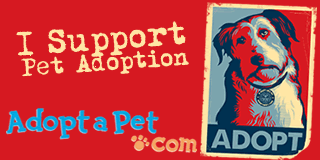...
I didn't write this but it looks like good advice! It comes from the wonderful program (and also website) of Rescue Inc., but I changed the title they used. They listed this as 10 Assumptions You Should Have About Adopting A Shelter Dog.
1. Your new dog knows nothing!
Although it’s very possible that your new dog has basic skills such as house manners and obedience, it is wiser to assume he has none and take on the responsibility of teaching him everything yourself. Expecting your new dog to understand the rules and boundaries that you live by can only disappoint every time he fails.
2. Your new dog has no pack leader!
When dogs are displaced, they lose the most important figurehead in their lives. Dogs live as our domesticated animals – as our partners. If we do not provide them with the basic information necessary to place ourselves in a leadership role, they will have no idea where to look for guidance every time a new challenge arises. Showing a dog where to find food, water and affection is not a leadership role. Only when you can affect his behavior on a moment-to-moment basis can you assure that your dog will be able to learn how to achieve this role of life partner and companion.
3. Your new dog needs rules!
Anxious, nervous, fearful or aggressive dogs do not act this way because they want to. They have these reactions simply because no one has ever shown them what to do. Before you bring your new dog home, take him for a walk. You want to be calm for the main entrance into your new sanctuary, and more important, you want him to be calm and comfortable, too. Taking your dog for a walk and expelling his energy - especially all of the pent up and toxic energy that a dog can accumulate in a shelter cage - is the best start you could ever offer.
4. Your new dog does not respect your home!
Your new dog may have never been allowed to roam free in an indoor environment, let alone one as comfortable as yours. If you allow your dog to run into your home ahead of you and immediately have the freedom of the whole house, you are essentially turning your whole home over to him. Making your dog wait before entering, making him follow your entrance into the house and by using a simple on-leash tactic for the first few hours or days could save months and years of misbehavior and training down the road.
5. Your new dog doesn’t respect your visitors!
Even if your new dog is very social with people, he will not think to control his excitement and invasive behavior if he believes this new home is his to own. But if you set this boundary from the beginning you have given him the knowledge that he will be able to use each and every time someone new comes into your home. Likewise - if you have already followed rules #1-4 then this task of asking for a polite greeting will be little more than an expression, a hand signal or a brief use of the leash. We make it harder for ourselves and for the dog when we do not set the rules from the beginning.
6. Your new dog may not like your visitors!
It is possible that your new dog has some fear or dominance issues that can lead him into an initial protection mode with new people. If this is the case: Don’t panic! If you have followed rules 1 through 4, then you must simply control your guests and your dog through initial introductions to ensure that you continue to provide the correct information to your dog. Your fear or anxiety will not benefit your dog and will in fact, make matters worse. If you do have these emotions, consider the possibility of help from a professional, especially with large and powerful breed dogs.
7. Your new dog may not like your other dog!
If you are unsure of the social skills your new dog has with other dogs, you cannot assume that introductions will go well. Never simply put two dogs in the house together and wait to see what happens. Introduce new dogs first on neutral territory and through a walk. Being able to smell, see, hear and feel another dog without forcing contact is the perfect first success for a new dog. If an immediate aggressive reaction is noted, desensitize this by moving forward and continuing the walk until you see the reaction subside. If it does not, then you know that you have an issue to deal with. Again – the assistance of a professional is advisable with notable social issues between dogs.
8. Your new dog does not need your emotion!
Of course it can be a very emotional experience to rescue a dog. But that flutter in your heart and stomach is understood in the animal kingdom as a lack of strength. If we can withhold these emotions when we first introduce ourselves to a new dog, we will be showing him that we are a source of strength, and he will automatically follow us.
9. You need to take it SLOW!
Your pace of life and expectations may not be natural to your new dog. You have the rest of your dog’s life for everything that you plan to show him. However, you only have his first day once, and it makes all the difference in the world for how he will behave every day to follow. Do not immediately parade your new dog to new people’s houses, yards or dog parks. If you first ask your new dog to respect you and your personal environment, this is challenge enough.
10. You have their whole life to love them, but only the beginning to teach them!
Dogs do live in the moment, but if you fail to show them certain things in their first minutes, hours and days with you, you will not only have to make up for this initial shortcoming, but you are giving them an opportunity to practice the wrong behaviors first. Then you will be working backwards to undo negative behaviors later on. Remember: Your confidence is built from their positive decisions. It is our choice to make this relationship what we want from the very first moment that we bring a new dog into our lives.
Share
skip to main |
skip to sidebar
A good dog is an oasis in a troubled world.

St. Francis, Patron Saint of this blog



A blog that advocates for shelter dogs and animals in general
Now more than ever, you are needed to donate your old blankets, towels, and sheets to your local animal shelter. With financial cut-backs, repairs on shelters are often put off, so if it's drafty, the animals suffer. I know my shelter uses rags to stuff under doors. No kidding! Empty out those closets... this is your chance to get rid of stuff and do something useful!
Choosing a dog may be the only chance you have to choose a relative!
Followers
Got Soldier? This group fosters their pets while they are deployed!
A good dog is an oasis in a troubled world.
ANIMAL POISON HOTLINE
Save this number!
1.888.232.8870
Save this number!
1.888.232.8870

St. Francis, Patron Saint of this blog
Search This Blog
Good Orgs
Good Search
YOU SEARCH OR SHOP...
WE GIVE!
WE GIVE!
Blog Archive
-
▼
2010
(243)
-
▼
June
(23)
- Never Walk Alone -- T-Shirt Drive!
- Des Moines, Iowa: Where a dog that hasn't attacked...
- 10 Things To Know About Adopting a Shelter Dog
- Free/Low Cost Spay/Neuter Clinic in Yonkers, NY --...
- Resources for Those Having Trouble Paying For Thei...
- A Dog's Last Will
- Cloud Nine Rescue Flights
- Welcome News in Georgia!
- Connection Between Animal Abuse and Violence Towar...
- Good News for the Animals at Robeson Animal Shelte...
- I am only one, but I am one. I cannot do everythi...
- A Word On a Good Shelter
- Letter From A Shelter Manager
- An open letter to abandoned dog's owners
- K9 Rescue Dog Dies During Training
- Save Todd Baran's Job!
- Dachshund Rescue of South Florida
- Bringing Dogs Home From Afghanistan
- Police Chief Takes Over Management of Forrest City...
- Dog Wash to Benefit Putnam Humane Society (NY)... ...
- Forrest City, Arkansas Animal Shelter Petition Sit...
- More on Forrest City, Arkansas Animal Shelter
- Forrest City, Arkansas Animal Shelter UPDATE -- NE...
-
▼
June
(23)

About Me

- dellbabe68
- To sit with a dog on a hillside on a glorious afternoon is to be back in Eden, where doing nothing was not boring - it was peace. ~Milan Kundera











